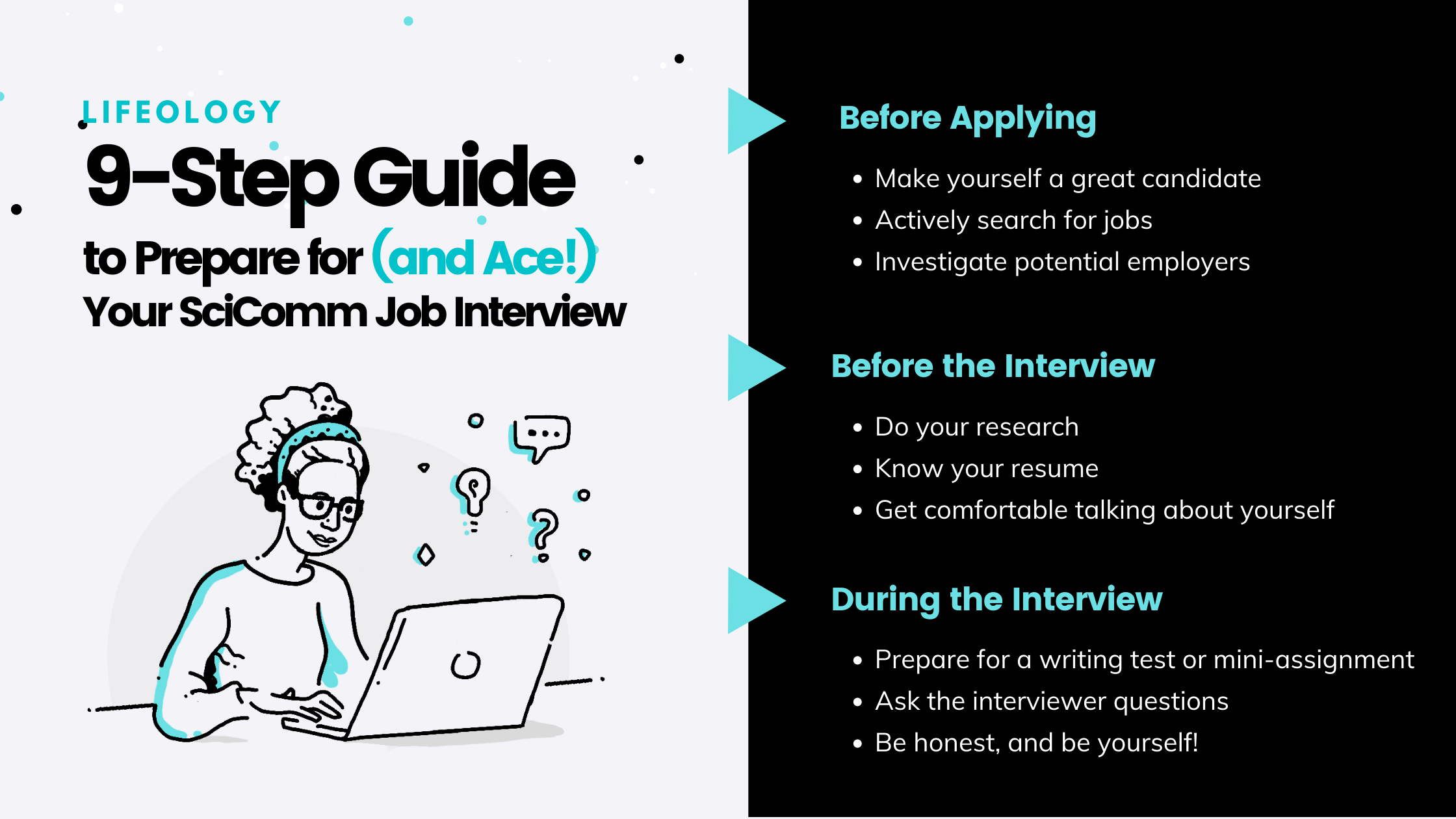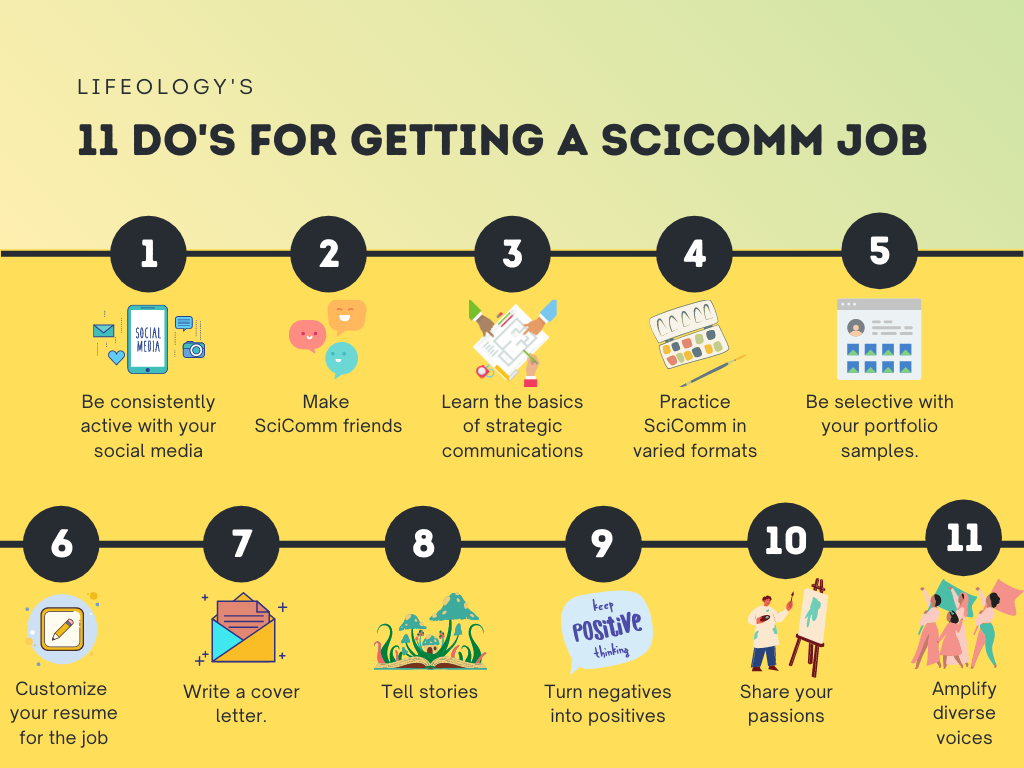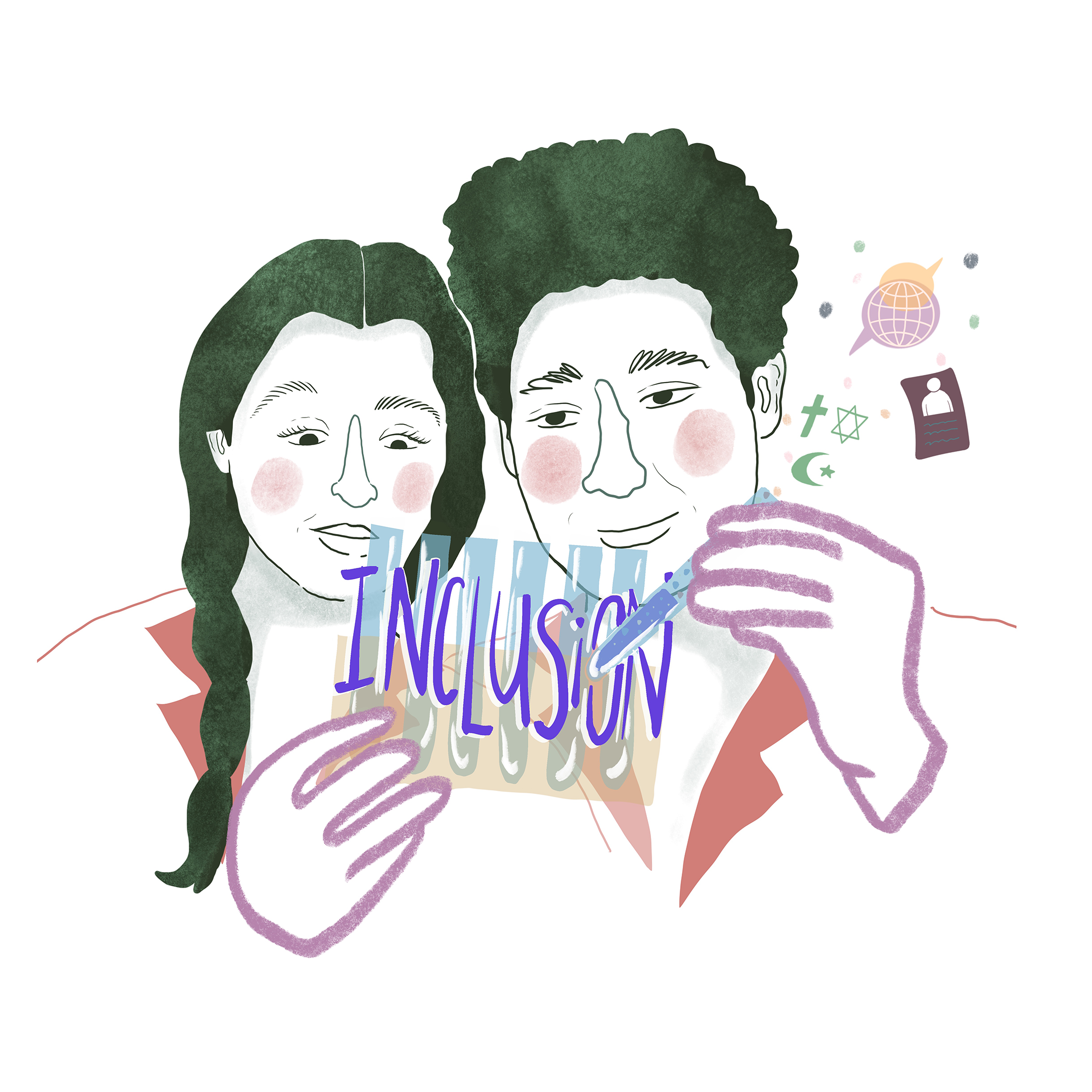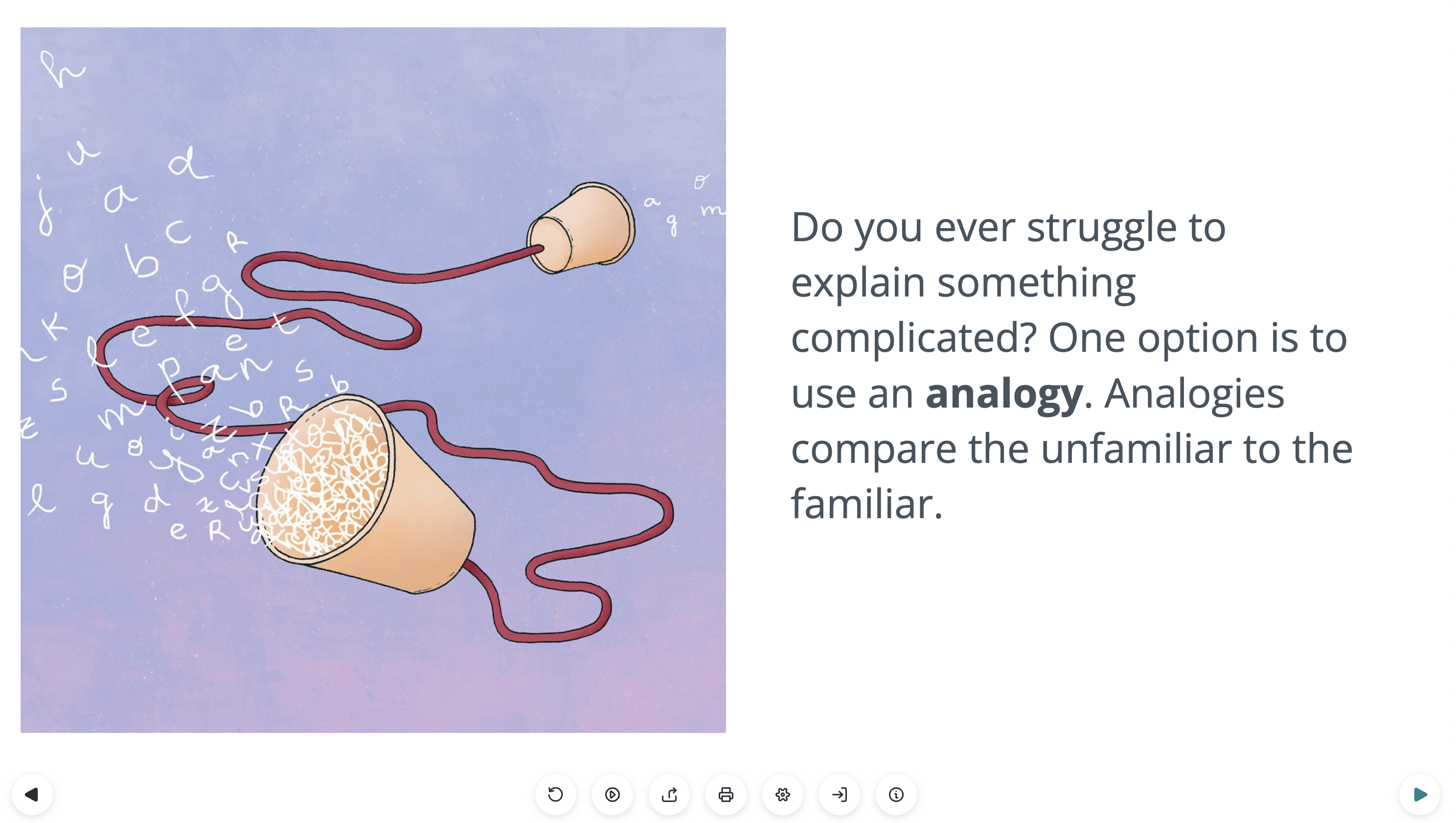Applying for SciComm jobs can feel much like being a detective, salesperson, and a record keeper…all rolled into one! And applying for SciComm jobs can feel like a full-time job! It’s easy to spend eight or more hours a day browsing job posting websites, researching companies and organizations, and preparing application materials.
Are you wondering:
- What should I be doing before applying for SciComm jobs?
- What happens once I land an interview?
- What can I do to have a successful interview?
This guide is for you!
The SciComm job application and interview process can vary greatly based on the type of job and the stage of career one is in. Because of this, I have prepared this guide for SciComm job interviewing, with the help of Paige Jarreau, to help those making a switch or an initial entry into SciComm.

It wasn’t long ago that I was on the hunt for my first SciComm job. I was fresh out of a graduate program focused in science communication. I am no stranger to applying for jobs or other positions, and I am definitely no stranger to interviews. I have interviewed for numerous part-time and full-time jobs and internships, interviewed for positions within organizations on my college campus, worked in my university’s career center preparing students for interviews, and conducted interviews for news articles during journalism school.
However, all that experience with interviewing did not completely prepare me for applying to SciComm jobs. Much of the same principles apply, and I will talk about those below; however, the numerous SciComm job applications and interviews were a bit different than anything I had done before. I hope this guide can help you begin to better understand and prepare for interviewing for a SciComm job.
Before applying
1. Make yourself a great candidate for SciComm jobs

In a previous blog post, Paige wrote about the 11 Do’s for Getting a SciComm Job. In that post, she provides great tips for preparing to enter the SciComm field. Some highlights include making SciComm friends, doing SciComm in varied formats, and amplifying diverse voices. Making SciComm friends expands your list of potential employers, people who can offer advice or provide job leads, and people who can inspire you to push your comfort zone and create amazing SciComm materials. Doing SciComm in varied formats will help you showcase your versatility and lead to a lot of stories and experiences to discuss in the interview. If you have a varied portfolio, there shouldn’t be a whole lot of “no, I haven’t done that.” Even when you think the answer is “no,” learn to lean into other experiences to turn a no into a yes (see more below). Finally, amplifying diverse voices is essential in the world and in SciComm. It’s going to be a lot easier to talk about why diversity is important to you if you have showcased this in your own SciComm efforts or other areas of your life.
2. Actively search for jobs
Although a mutual connection may lead you to your next job, you should still be actively searching and be well-informed of the current job market. You want to know what roles, qualifications, and salary and other benefits are being offered in similar positions to what you’re applying for. This can help you ultimately make your decision of where to apply to and where to accept a position.
3. Research any potential company/organization before applying
Doing this saves you and the company or organization time and effort. You don’t have to spend your time with application materials if you don’t like the company’s mission, current SciComm activities, or anything else you find out about them. You can look for reviews from former and current employees, check out their social media presence, browse their website, and do a Google News search to find out a lot about the company and its atmosphere.

After being offered the interview
4. Do your research about:
- The department you will be working in (you should already know about the company)
- Person interviewing you and any other people it’s obvious you could be working with
- The organization’s current SciComm activities
This research and preparation will show that you are committed to the position. It will also show you are prepared for the interview, and that will reflect well on your work ethic. From your research, you should now have talking points, questions to ask based on anything you read or saw, and maybe even things in common or things about yourself that relate to the company or its mission. It goes a long way toward showing that you did your homework about the company, department, and people you could be working with.
5. Know your resume (and how it applies to the position!)
Everything on your resume and even your LinkedIn profile or public social media pages are fair game for interviewers to ask about. Be sure you refresh yourself about anything on your resume but also anything you did at old positions or on old projects. If you are making the switch from science into SciComm, think about how the things you’ve done before relate to the position you have applied for. Even if you think an experience has no relation to the current position, refresh yourself on it because you never know when it could turn out to perfectly relate to a scenario or interview question.
6. Get comfortable talking about yourself
Below are some common interview questions. Remember, these questions can look different for different SciComm positions. However, the goal is to give you a list of questions to start with. By familiarizing yourself with these questions, you should be more comfortable and prepared to answer questions like these. Ultimately, you should feel comfortable talking about yourself, your passions, accomplishments, and setbacks. Prepare for your introduction by having an “elevator pitch” of your story into SciComm, perhaps in a way that accentuates your philosophy toward science communication and what you’re passionate about within it. For the rest of the questions, don’t prepare a word-for-word script. This will inhibit your true self from shining through, and it will likely make you stumble if you forget a word or are asked an adjacent question. Instead, get comfortable talking to others about these questions and yourself.
- Why did you apply to this position? Why are you interested in working here with our team?
- How do you feel about our organization’s mission? Why do you think this is important or what does it mean to you personally?
- How have you navigated collaboration with someone outside of your field, who used different language and jargon, or who saw things differently than you?
- Where do you see yourself in three to five years? What are your mid to long-term career goals?
- How do you resolve conflict and/or work on a team?
- Work environment: How confident are you working on multiple things (probably all at once!), juggling different projects and deadlines? // How do you feel working in a fast-paced environment? // What kind of work environment do you thrive in and are looking for?
- Tell me about yourself and how you got into SciComm.
- What is science or health communication to you? Why do you think it is important?
- Walk me through your writing process.
- Tell me about three of your favorite stories you have written // Tell me about a project you’re most proud of.
- What was the most challenging story or project you worked on and why was it so challenging?
- Conflict: Tell me about a conflict you encountered while working on a story or SciComm project, and how did you solve it? // Tell me about a time when you had a conflict or a disagreement with a source about a quote or piece of scientific information and how you solved it.
- Diversity: How or why is diversity and inclusion in science and science communication important to you? // How would you ensure that your writing and communication work for us incorporated diverse voices and perspectives, and was inclusive? // How have you demonstrated the importance of diversity in your writing or communication efforts?
- Scenario-based: Think through an example campaign (identified goal and audience). What kind of content might you develop? What media channel(s) might you use? Talk us through your plan.
- Social media/web: What would you do differently for our social media presence? // Do you have any feedback about our social media or website? // What is your experience with writing for different formats (print, social, web, etc.)? // What experience do you have in managing online communities and social media accounts?

During the interview
7. Prepare for a writing or other benchmark to test your skills and competencies.
Depending on who you ask, this interview practice can be met with some controversy. Nonetheless, it can happen and you should be prepared to navigate the scenario. You could be asked to complete the test before, during, or after the interview. It would be perfectly acceptable to ask the interviewer questions like how long this assignment should reasonably take you and what it might be used for to make sure the interviewer is thinking reasonably about the assignment and is not trying to get free/unpaid labor. Sometimes, organizations will pay you for your time for such a benchmark. Above all else, be honest with the interviewer and don’t feel like you have to agree to do an assessment if it doesn’t feel right or you don’t have the time. However, there may be a good reason that the interviewer is asking for a new sample (e.g. the position calls for unique skills), so try to take it in stride while navigating other responsibilities you have. For example, for my position at Lifeology, Paige asked me to write the beginning of a Lifeology course as part of my interview. Doing the assignment allowed me to see what one of the duties of the potential position was like and provided Paige an opportunity to assess my skills in a real-time example versus articles I had written, which are very different from writing a Lifeology course. It was a good experience, which ultimately helped me decide to accept the offer to join the Lifeology team.
8. Ask the interviewer questions.
It is great if you can manage a back and forth conversation with the interviewer about topics of mutual interest. You can ask the interviewer a bit about themselves, how they got into their position, or what they are interested in or passionate about to try to find mutual ground early in the interview. It doesn’t mean that this will help fill any gaps you have in abilities or requirements for the job, but it can really help the interviewer get to know what it would be like working for you, helps you know if you would “gel” in this position, and will make the interview stand out.
8. Be honest and be yourself!
Take pauses to think… a well formed thought is much better than a blabber.
Even just telling the interviewer “let me think about that for a bit” or asking to move to another question while you think about that question is better than an unformed answer.
Go beyond yes/no or very brief answers.
Like any good scientist being interviewed by the media, you could “pivot” or turn a so-so interview question into an opportunity to talk about some skills, experience or passion you have that you feel would benefit this position but that the interviewer didn’t think to ask about! Expand on your answers! This is your time to shine, and you can’t really talk too much (although, do pause to see if your interviewer has questions). It can make the interview awkward and difficult for your interviewer if you just leave your responses at yes and no answers.
If you don’t have a good answer for a question an interviewer asks, use it to point to a passion, interest or experience in a related area.
If the interviewer asks you if you have experience with a particular audience or comms format, for example, instead of just saying “no,” you might bring up a story of a time when you saw another scicommer having success with that audience or format, and you learned from them and hope to learn more and put learnings from others into practice here. Turn “no’s” into opportunities to talk about things you’d love to learn or experiences that are related in any way. This will reflect very positively on your adaptability, ability to think of your feet, and skills that the interviewer may not be asking about but that may still be useful in this position.
Get to know your interviewer.
Ice-breaking conversation at the beginning of the interview can be great for this! Did you find anything during your pre-interview research that you could relate to the interviewer about? If not, ask them about themselves and their passions, reasons for working at the company, or their personal SciComm goals.
Prepare “mini-stories” about things you’ve done or learned that you can pull out and tell during the interview.
Talk through real-life examples, “case studies,” or stories of experiences you’ve had that reveal more about you and your abilities/skills. By “storifying” your experiences, from struggles to things you learned to impacts of your work, you will make them more memorable and easier for your interviewer to follow.




